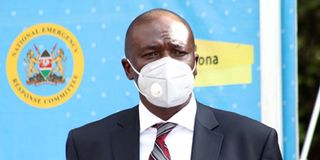Kenya on high alert over new deadly Covid variant

What you need to know:
Travellers from six southern African countries will be subjected to exit and entry screening at all points of entry to ensure that transmission is controlled
Kenya is on high alert over a new coronavirus variant first detected in South Africa and has moved to enhance surveillance on travellers coming into the country from six southern African countries.
Acting Director-General of Health Patrick Amoth Friday November 26 said that passengers coming into the country from Namibia, Lesotho, Botswana, Eswatini, Zimbabwe, and Hong Kong will be required to go into quarantine, and get tested repeatedly.
Additionally, travellers from South Africa, where the variant known as B.1.1.529 was first detected, will also be subjected to exit and entry screening at all points of entry to ensure that transmission is controlled, Dr Amoth added in a statement sent to newsrooms.
“...passenger air traffic between Kenya and South Africa is significant and so the potential of introduction is a real threat. This can, however, be mitigated by measures taken in South Africa to control transmission rates, exit screening in all affected countries, and effective entry screening in Kenya at all points of entry used by passengers from the affected countries,” he said.
The move came shortly after the UK banned flights from South Africa, Namibia, Lesotho, Botswana, Eswatini, and Zimbabwe following threats of the new variant.
India has also initiated rapid diagnostic testing (RDT) for all passengers arriving from the six countries. It is expected that more countries will place the six and any other country reporting the B.1.1.529 variant on specific restrictions including quarantine measures and flight bans.
As some world leaders have hastily responded by issuing new precautions and travel restrictions, Africa Centres for Disease Control and Prevention (Africa CDC) “strongly” discouraged the imposition of travel ban for people originating from countries that have reported the variant saying: “In fact, over the duration of this pandemic, we have observed that imposing bans on travelers from countries where a new variant is reported has not yielded a meaningful outcome. Rather implementing public health and social measures (PHSM), including mask-wearing, physical distancing, and hand washing should be prioritised.
Researchers are racing to determine whether a fast-spreading variant in South Africa poses a threat to Covid-19 vaccines’ effectiveness.
The World Health Organisation (WHO) is set to meet to assess the B.1.1.529 variant feared to be the worst Covid-19 variant yet identified. The meeting will determine if the variant should be designated a variant of “interest” or of “concern.”





